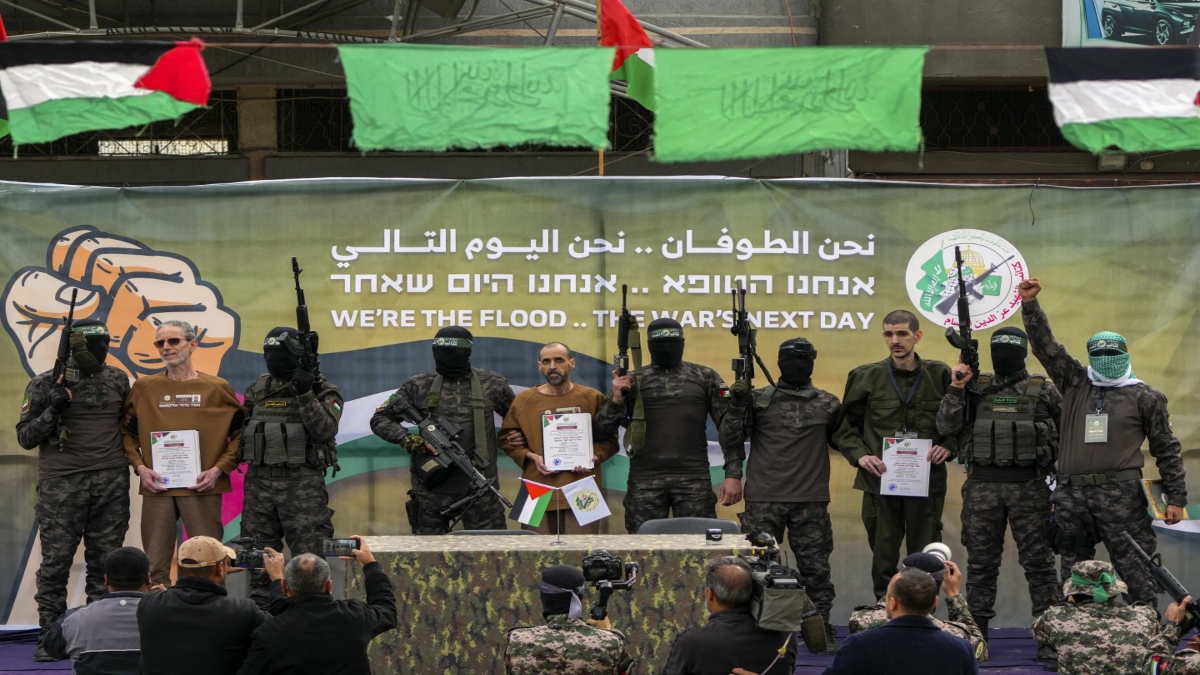The gaunt appearances of three Israeli hostages freed by Hamas left the country shocked, sparking anger and questions over how they were treated in captivity. On Saturday, Hamas freed three hostages from Gaza whereas Israel released 183 prisoners in the fifth exchange of the ongoing ceasefire.
The appearances of the three men have the potential to increase pressure on Israel’s Prime Minister Benjamin Netanyahu to bring the remaining hostages home as early as possible. The three men appeared to be more frail than the 13 Israelis and five Thai nationals who had been previously released in the exchange.
Meanwhile, Palestinian prisoners released to Ramallah hours after the Israelis were freed also looked extremely thin. Not only this, seven out of 43 needed hospitalisation, the Palestinian Prisoners Club said. Rights groups and whistleblowers have described a policy of “institutionalised abuse” in Israeli jails and detention centres as the reason behind the prisoners’ condition.
Some of the Palestinian prisoners who were released in the exchange were serving multiple life sentences for violent offences. Israel’s hostage coordinator, Brig Gen Gal Hirsch, said he viewed the condition of those freed with great concern.
Netanyahu faces a new kind of pressure
The Israeli Prime Minister who is conducting meetings with US President Donald Trump’s administration in Washington has already indicated that he is prepared to resume the war. He repeatedly insisted that only a “complete” military victory can keep Israel safe. “We will eliminate Hamas, and we will return our hostages,” he said in a statement celebrating the releases, and attacking the way the hostages were treated.
He has also ordered an Israeli delegation in Qatar to discuss “technical matters”, but no substantial talks will start until after a security cabinet meeting on Monday, The Times of Israel reported. However, given the conditions of the hostages, the Israeli premier is facing significant pressure back home.
Einav Zangauker, whose son Matan Zangauker is in Gaza and not due for release under the first stage of the deal slammed Netanyahu and accused him of “sitting in a hotel in Washington, trying to sabotage” a deal that would save her son. “Tell them to shorten the first stage, close [the deal] on the second stage, and this time, bring them all home at once,” she said in a statement.
Impact Shorts
More ShortsThe next round of negotiation was supposed to start at the beginning of the week when Netanyahu met Trump’s Middle East envoy, Steve Witkoff, but Hamas political bureau member, Basem Naim said that no such talks are yet underway.
Netayahu’s struggle to save his seat
Meanwhile, the far-right finance minister Bezalel Smotrich have been an ardent critic of the ceasefire deal and have threatened to quit to coalition if the war does not resume. It is pertinent to note that Netanyahu’s coalition already took a hit after another far-right minister Ben Gvir and his party withdrew their support and resigned from the office.
Hence, the Israeli premier needs Smotrich’s support to save his post. On Saturday, Smotrich slammed Israelis who had compared the freed hostages to emaciated victims of Nazi concentration camps, saying it was a “grave mistake” that showed “contempt” for the Holocaust.
He suggested that those who are calling for the extension of the Gaza ceasefire over fears about the condition of dozens of Israeli hostages still held in Gaza want to “surrender to Hamas”. Hence, Netanyahu is navigating through a slippery slope where he has to keep both the public and his coalition party happy.
With inputs from agencies.


)

)
)
)
)
)
)
)
)



